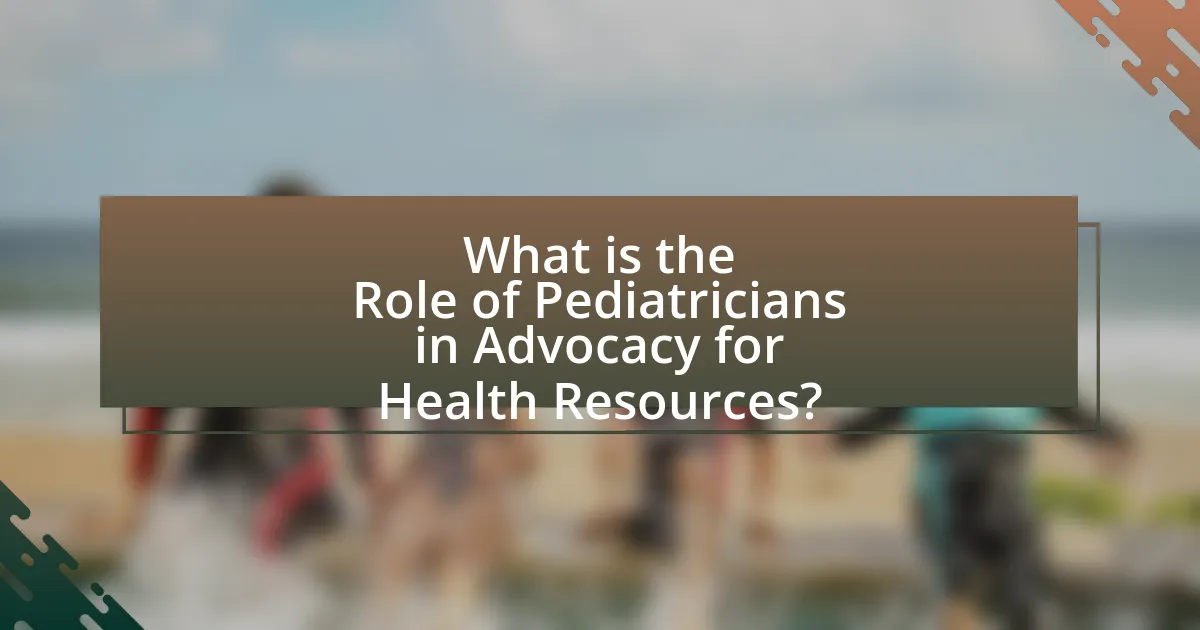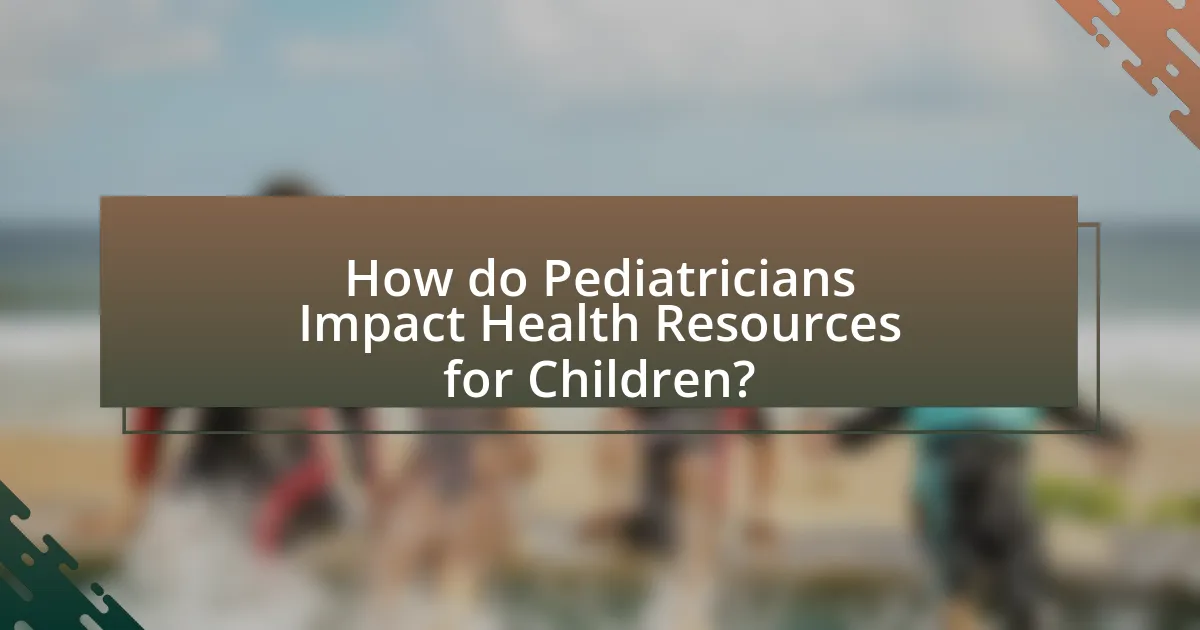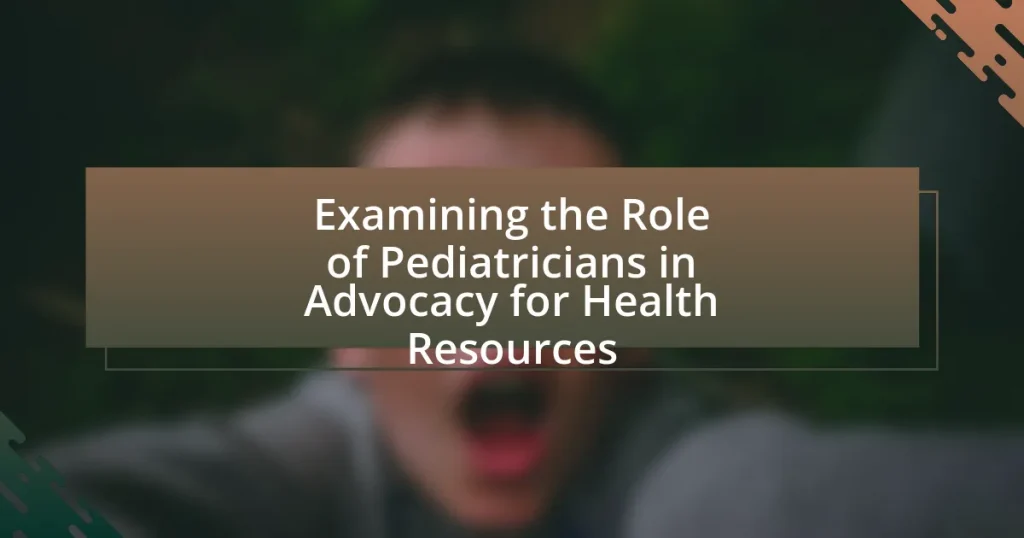Pediatricians play a vital role in advocating for health resources that ensure access to quality healthcare for children. They influence health policies, engage in community outreach, and collaborate with organizations to address health disparities, focusing on areas such as vaccinations, mental health services, and nutritional programs. Despite facing challenges like limited resources and time constraints, pediatricians employ strategies such as community engagement and policy influence to promote child health. The article examines the unique perspectives pediatricians bring to advocacy, the barriers they encounter, and the emerging trends in pediatric advocacy, highlighting the importance of continuous education and collaboration in their efforts to improve health outcomes for children.

What is the Role of Pediatricians in Advocacy for Health Resources?
Pediatricians play a crucial role in advocating for health resources by promoting policies that ensure access to quality healthcare for children. They leverage their expertise in child health to influence legislation, engage in community outreach, and collaborate with organizations to address health disparities. For instance, pediatricians often participate in initiatives aimed at increasing funding for children’s health programs, which can lead to improved health outcomes. Their advocacy efforts are supported by data showing that children with access to comprehensive healthcare services experience better developmental and health trajectories.
Why are Pediatricians Important in Health Advocacy?
Pediatricians are crucial in health advocacy because they serve as primary healthcare providers for children, influencing health policies and practices that affect pediatric populations. Their expertise in child development and health issues enables them to identify and address systemic barriers to healthcare access, ensuring that children’s needs are prioritized in public health discussions. For instance, pediatricians often advocate for vaccinations, nutrition programs, and mental health resources, which are essential for child well-being. Research indicates that pediatricians who engage in advocacy can lead to improved health outcomes, as seen in initiatives that have successfully increased immunization rates and access to preventive care services.
What unique perspectives do Pediatricians bring to health advocacy?
Pediatricians bring a child-centered perspective to health advocacy, emphasizing the unique developmental, emotional, and social needs of children. Their training equips them to understand the long-term implications of health policies on pediatric populations, allowing them to advocate effectively for resources that promote child health and well-being. For instance, pediatricians often highlight the importance of preventive care, early intervention, and access to mental health services, which are critical for addressing childhood obesity and mental health disorders. Their insights are supported by data indicating that early access to healthcare significantly improves health outcomes, as seen in studies published by the American Academy of Pediatrics, which advocate for policies that ensure comprehensive healthcare access for all children.
How do Pediatricians influence health policy decisions?
Pediatricians influence health policy decisions by advocating for child health issues and providing expert insights on pediatric care. Their involvement in professional organizations, such as the American Academy of Pediatrics, allows them to shape policy recommendations based on clinical evidence and public health data. For instance, pediatricians have played a crucial role in promoting vaccination policies, which are supported by research indicating that vaccines significantly reduce childhood morbidity and mortality rates. Additionally, pediatricians often collaborate with lawmakers to inform legislation on issues like childhood obesity and mental health, ensuring that policies reflect the best interests of children and families.
What Challenges do Pediatricians Face in Advocacy?
Pediatricians face several challenges in advocacy, including limited resources, time constraints, and the complexity of healthcare policies. Limited funding for pediatric health initiatives restricts their ability to effectively advocate for necessary changes. Time constraints arise from their demanding clinical responsibilities, which can hinder their participation in advocacy efforts. Additionally, the complexity of healthcare policies makes it difficult for pediatricians to navigate and influence legislative processes effectively. These challenges can impede their ability to promote children’s health and access to essential resources.
What barriers limit Pediatricians’ effectiveness in advocacy?
Pediatricians face several barriers that limit their effectiveness in advocacy, including time constraints, lack of training in advocacy skills, and insufficient institutional support. Time constraints arise from their demanding clinical responsibilities, which often leave little room for advocacy efforts. Additionally, many pediatricians report feeling unprepared to engage in advocacy due to a lack of formal training in this area, which can hinder their confidence and effectiveness. Furthermore, without strong institutional support, such as resources or encouragement from healthcare organizations, pediatricians may struggle to prioritize advocacy initiatives, ultimately reducing their impact on health policy and resource allocation for children’s health.
How can Pediatricians overcome these challenges?
Pediatricians can overcome challenges in advocating for health resources by actively engaging in community outreach and education initiatives. By collaborating with local organizations and schools, pediatricians can raise awareness about health issues affecting children and promote available resources. Evidence shows that community-based interventions, such as health fairs and informational workshops, significantly increase access to health services for families. Additionally, pediatricians can leverage data from studies, like the American Academy of Pediatrics’ findings on childhood obesity, to advocate for policy changes that improve health resources in their communities. This proactive approach not only addresses immediate health concerns but also fosters long-term improvements in children’s health outcomes.
What Strategies do Pediatricians Use for Advocacy?
Pediatricians use several strategies for advocacy, including community engagement, policy influence, and education. Community engagement involves collaborating with local organizations to address health disparities and improve access to care for children. Policy influence is achieved by participating in legislative processes, providing expert testimony, and advocating for child-friendly policies at local, state, and national levels. Education is focused on raising awareness among parents, caregivers, and policymakers about children’s health issues, often through workshops, seminars, and public health campaigns. These strategies are supported by evidence showing that pediatricians who actively engage in advocacy can significantly impact health outcomes for children, as demonstrated by studies linking advocacy efforts to improved access to healthcare services and better health policies.
How do Pediatricians engage with communities to promote health resources?
Pediatricians engage with communities to promote health resources by organizing outreach programs, providing education on health issues, and collaborating with local organizations. These professionals often conduct health fairs, workshops, and seminars to raise awareness about preventive care and available services. For instance, a study published in the Journal of Pediatrics highlighted that pediatricians who participate in community health initiatives significantly improve access to vaccinations and screenings, demonstrating their impact on public health outcomes. Additionally, pediatricians frequently partner with schools and community centers to disseminate information about nutrition, mental health, and chronic disease management, further solidifying their role as advocates for health resources in the community.
What role do collaborations play in Pediatricians’ advocacy efforts?
Collaborations significantly enhance pediatricians’ advocacy efforts by pooling resources, expertise, and influence to address children’s health issues more effectively. Through partnerships with organizations, community groups, and other healthcare professionals, pediatricians can amplify their voices and reach broader audiences, thereby increasing awareness and driving policy changes. For instance, the American Academy of Pediatrics often collaborates with public health agencies to advocate for immunization policies, resulting in higher vaccination rates and improved public health outcomes. These collaborative efforts demonstrate that working together can lead to more impactful advocacy initiatives that ultimately benefit children’s health and well-being.

How do Pediatricians Impact Health Resources for Children?
Pediatricians significantly impact health resources for children by advocating for improved access to healthcare services and preventive care. They play a crucial role in identifying health disparities and mobilizing community resources to address these gaps. For instance, pediatricians often collaborate with public health organizations to promote vaccination programs, which have been shown to reduce disease incidence among children by over 90% in some cases. Additionally, they contribute to policy development aimed at enhancing child health services, such as the American Academy of Pediatrics’ initiatives that have influenced legislation to expand Medicaid coverage for low-income families. Through these efforts, pediatricians not only provide direct care but also shape the broader healthcare landscape to ensure that children receive the necessary resources for optimal health.
What specific health resources do Pediatricians advocate for?
Pediatricians advocate for a variety of specific health resources, including vaccinations, mental health services, nutritional programs, and access to preventive care. Vaccinations are emphasized as essential for preventing infectious diseases, with the CDC recommending a comprehensive immunization schedule for children. Mental health services are advocated to address the rising rates of anxiety and depression among youth, with pediatricians often referring families to specialized care. Nutritional programs, such as the Supplemental Nutrition Assistance Program (SNAP), are supported to combat childhood obesity and ensure access to healthy foods. Additionally, pediatricians promote access to preventive care services, including regular check-ups and screenings, to monitor and enhance children’s overall health.
How do these resources address children’s health needs?
These resources address children’s health needs by providing access to essential medical care, nutritional guidance, and mental health support. Pediatricians advocate for these resources to ensure that children receive comprehensive health services, which are critical for their physical and emotional development. For instance, studies show that regular pediatric visits can lead to early detection of health issues, improved vaccination rates, and better management of chronic conditions, thereby enhancing overall health outcomes for children.
What evidence supports the need for these health resources?
Evidence supporting the need for health resources includes rising childhood obesity rates, which have tripled since the 1970s, indicating a significant public health concern. According to the Centers for Disease Control and Prevention (CDC), approximately 19.7% of children and adolescents aged 2-19 years are obese, leading to increased risks of diabetes, heart disease, and other health issues. Additionally, studies show that access to preventive health services can reduce hospitalizations and improve health outcomes, emphasizing the necessity for pediatricians to advocate for these resources. The American Academy of Pediatrics highlights that early intervention and access to health resources can significantly improve children’s long-term health trajectories.
How do Pediatricians Measure the Success of Their Advocacy?
Pediatricians measure the success of their advocacy through various metrics, including improved health outcomes, increased access to care, and policy changes. They often track specific indicators such as vaccination rates, reductions in childhood obesity, and the implementation of new health policies that benefit children. For instance, a study published in the Journal of Pediatrics highlighted that pediatricians who engaged in advocacy saw a significant increase in immunization rates in their communities, demonstrating a direct correlation between their efforts and positive health outcomes. Additionally, pediatricians may assess the effectiveness of their advocacy by evaluating the impact of legislative changes on children’s health services, thereby quantifying their influence in shaping health policies.
What metrics are used to evaluate advocacy outcomes?
Metrics used to evaluate advocacy outcomes include policy changes, public awareness levels, stakeholder engagement, and funding increases. Policy changes can be measured by tracking legislation or regulations influenced by advocacy efforts, while public awareness can be assessed through surveys or media coverage metrics. Stakeholder engagement is evaluated by the number of partnerships formed or participation rates in advocacy events. Funding increases can be quantified by analyzing financial contributions or grants received as a result of advocacy initiatives. These metrics provide concrete evidence of the effectiveness and impact of advocacy efforts in the health resources sector.
How do Pediatricians adjust their strategies based on these evaluations?
Pediatricians adjust their strategies based on evaluations by analyzing patient data, feedback, and health outcomes to tailor their approaches to individual needs. For instance, if evaluations reveal a high prevalence of obesity in a patient population, pediatricians may implement targeted nutritional counseling and physical activity programs. This adjustment is supported by evidence from studies indicating that personalized interventions can significantly improve health outcomes in children, such as the 2018 research published in the Journal of Pediatrics, which demonstrated that tailored health strategies led to a 30% reduction in obesity rates among participating children.

What Future Trends are Emerging in Pediatric Advocacy?
Future trends in pediatric advocacy include increased collaboration between healthcare providers and community organizations, a focus on mental health resources for children, and the integration of technology in advocacy efforts. Pediatricians are increasingly partnering with local organizations to address social determinants of health, which is essential for holistic child health. Additionally, mental health advocacy is gaining prominence, as studies show that one in five children experiences a mental health disorder, highlighting the need for accessible resources. Furthermore, the use of telehealth and digital platforms is expanding, allowing pediatricians to reach a broader audience and advocate for health resources more effectively. These trends reflect a shift towards a more comprehensive and inclusive approach to pediatric health advocacy.
How is technology influencing Pediatricians’ advocacy efforts?
Technology is significantly enhancing pediatricians’ advocacy efforts by providing tools for data collection, communication, and outreach. Pediatricians utilize electronic health records and telemedicine platforms to gather and analyze health data, which informs their advocacy for improved health policies and resources. For instance, the American Academy of Pediatrics has leveraged technology to disseminate research findings and best practices, thereby influencing public health initiatives. Additionally, social media platforms enable pediatricians to engage with communities and policymakers, amplifying their voices in discussions about children’s health issues. This integration of technology not only streamlines advocacy efforts but also increases their effectiveness by reaching broader audiences and fostering collaboration among healthcare professionals.
What digital tools are Pediatricians using for advocacy?
Pediatricians are using digital tools such as social media platforms, telehealth services, and advocacy-focused websites for advocacy. Social media platforms like Twitter and Facebook enable pediatricians to share information, engage with the community, and mobilize support for health initiatives. Telehealth services facilitate access to care and allow pediatricians to advocate for policy changes that improve healthcare delivery. Advocacy-focused websites, such as the American Academy of Pediatrics’ site, provide resources and tools for pediatricians to promote child health issues effectively. These tools enhance communication and outreach, making advocacy efforts more impactful.
How can telehealth expand access to health resources?
Telehealth can expand access to health resources by providing remote consultations and services, which eliminate geographical barriers for patients. This technology allows individuals in underserved or rural areas to connect with healthcare providers without the need for travel, thereby increasing the availability of medical advice and treatment. According to a study published in the Journal of Medical Internet Research, telehealth services can improve access to care by 50% in rural populations, demonstrating its effectiveness in reaching those who may otherwise lack adequate healthcare resources.
What Best Practices Should Pediatricians Follow in Advocacy?
Pediatricians should engage in advocacy by actively participating in policy discussions, collaborating with community organizations, and educating families about health resources. Engaging in policy discussions allows pediatricians to influence legislation that affects children’s health, as evidenced by the American Academy of Pediatrics’ involvement in shaping health policies. Collaborating with community organizations enhances access to resources and support for families, demonstrated by initiatives like the Reach Out and Read program, which promotes literacy and early childhood development. Educating families empowers them to navigate health systems effectively, as pediatricians can provide crucial information about available services and resources.
How can Pediatricians effectively communicate their advocacy messages?
Pediatricians can effectively communicate their advocacy messages by utilizing clear, evidence-based language and engaging with diverse audiences through multiple platforms. They should focus on presenting data that highlights the importance of child health issues, such as statistics on childhood obesity or vaccination rates, to substantiate their messages. For instance, the American Academy of Pediatrics emphasizes the need for pediatricians to advocate for policies that support children’s health, citing that effective communication can lead to increased public awareness and policy changes. By leveraging social media, community events, and collaborations with other health professionals, pediatricians can broaden their reach and impact, ensuring their advocacy resonates with both the public and policymakers.
What role does continuous education play in effective advocacy?
Continuous education is essential for effective advocacy as it equips advocates with up-to-date knowledge and skills necessary to address complex health issues. Pediatricians, for instance, benefit from ongoing training that enhances their understanding of emerging health trends, policies, and best practices, enabling them to advocate more effectively for health resources. Research indicates that continuous professional development leads to improved advocacy outcomes, as informed advocates can better influence policy decisions and mobilize community support. For example, a study published in the Journal of Pediatrics highlights that pediatricians who engage in continuous education are more likely to participate in advocacy efforts and successfully impact health policy changes.
What Resources are Available for Pediatricians in Advocacy?
Pediatricians have access to various resources for advocacy, including professional organizations, educational materials, and policy toolkits. Organizations such as the American Academy of Pediatrics (AAP) provide guidelines, training, and support for pediatricians to engage in advocacy efforts effectively. Additionally, the AAP offers resources like the “Advocacy Toolkit,” which includes strategies for influencing health policy and improving child health outcomes. Research indicates that pediatricians who participate in advocacy can significantly impact public health policies, as evidenced by studies showing improved health outcomes in communities where pediatricians are actively involved in advocacy initiatives.
Where can Pediatricians find training and support for advocacy?
Pediatricians can find training and support for advocacy through organizations such as the American Academy of Pediatrics (AAP), which offers resources, workshops, and online courses focused on advocacy skills. Additionally, the AAP provides access to advocacy toolkits and networking opportunities that connect pediatricians with experienced advocates in the field. These resources are designed to enhance pediatricians’ ability to influence health policy and improve health outcomes for children.
What organizations provide resources for Pediatric health advocacy?
Organizations that provide resources for pediatric health advocacy include the American Academy of Pediatrics (AAP), which offers guidelines and policy statements to support children’s health; the Children’s Defense Fund (CDF), which focuses on child welfare and advocacy; and the National Association of Pediatric Nurse Practitioners (NAPNAP), which provides education and resources for pediatric healthcare providers. These organizations contribute to pediatric health advocacy by developing programs, conducting research, and influencing policy to improve health outcomes for children.
